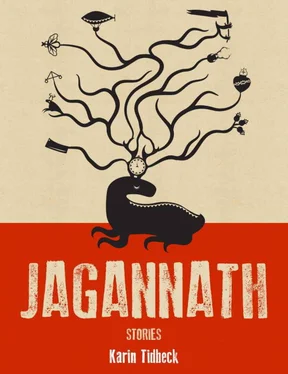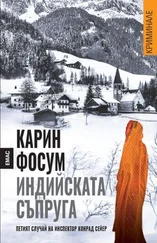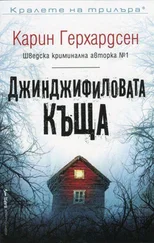Karin Tidbeck

JAGANNATH
(stories)
Introduction
by Elizabeth Hand
It’s rare, almost unheard of, to encounter an author so extraordinarily gifted she appears to have sprung full-blown into the literary world, like Athena from the head of Zeus. But we live in extraordinary times, and with Karin Tidbeck, we appear to have gotten the artist our times deserve.
A hundred years ago, the great fantasist Lord Dunsany wrote of the world beyond the fields we know. With the ascent of fantasy as the dominant popular literary form of the early twenty-first century, we’ve seen that world grow increasingly gentrified, commodified, and mainstreamed. This is a long way of saying that, when it comes to speculative fiction, it takes a lot to surprise me. I can’t think of when I last read a collection that blew me away the way that Jagannath has, or one that’s left me somewhat at a loss to describe just how strange and beautiful and haunting these tales are.
Of course, Tidbeck’s appearance on the literary scene isn’t quite as sudden as it seems to me. She’s been publishing for a decade, and many of the stories contained herein first appeared in her native Sweden, where they were collected in Vem är Arvid Pekon? English translations of several of these tales have been published in U.S. and U.K. magazines and anthologies. In 2010 she attended the prestigious Clarion Writer’s Workshop, a longtime proving ground for writers who have gone on to become major voices in the field. She’s also one of the few writers of the fantastic to have received a grant from the Swedish Authors Fund. Her first novel will be published this year in Sweden.
Yet there’s still something startling about the presence of so many remarkable pieces in such a deceptively slender volume. In its feverish intensity and sublimely estranging effects, her work sometimes evokes that of James M. Tiptree Jr. (Alice Sheldon); in particular, “Aunts” and the title story can hold their own with Tiptree’s classic depiction of alien consciousness, “Love is the Plan the Plan is Death.”
But Tidbeck’s writing is more generous and far emotionally engaged than Tiptree’s. Even when the inexplicable occurs, as it does throughout these tales, a reader responds as Tidbeck’s characters do, with an underlying empathy. Their sense of loss or astonishment or melancholy resignation never trumps the deeper sense of recognition that, as Hamlet observed, there are more things in heaven and earth than are dreamt of in our philosophy. As in “Augusta Prima,” where the title character asks,
“I have to know… What is the nature of the world?”
The djinneya smiled with both rows of teeth.
“Which one?”
In an interview earlier this year, Tidbeck spoke of the crepuscular (real) world where she lives in Sweden:
We spend a lot of time in twilight, which is a liminal condition, a no-man’s land. The light has an eerie and melancholy quality. I suppose this has carried over into my writing as well, both in the sense of the eerie and melancholy, but also the sensation of having stepped sideways into another world where the sun has stopped in its course.
This liminal sense of transcending borders holds true for all of the stories in Jagannath, which span folktale, fantasy, magic realism, science fiction, and, in “Pyret,” a Borgesian taxonomy of an imaginary creature. Many of these tales are disturbing; they are also darkly funny and, to this American’s sensibility at least, genuinely strange. Tidbeck shares with the great Robert Aickman a gift for invoking a profound sense of disassociation from the world we think we know, pointing us toward a breach through which any number of unimaginable things might (and do) emerge. More than anything, there is a palpable absence in many of her stories: of loved ones (especially parents); of the passage of time; of knowledge of the very world the characters inhabit.
Still, Nature abhors a vacuum, even in a parallel plane of existence, and unforeseen things emerge to fill that void. “Reindeer Mountain,” perhaps my favorite of all the stories collected here, is a tour-de-force of the uncanny. “Arvid Pekon” may make you reluctant to ever pick up a telephone again, and “Brita’s Holiday Village” reminds one how unsettling a resort in the off-season can be. The narrator of “Cloudberry Jam” recounts a conversation with the creature she has made in a tin can:
“Why did you make me?” you said.
“I made you so that I could love you,” I said.
Similarly, Karin Tidbeck has written these stories so that readers may love them. I certainly do. And I suspect you will, too.
Franz Hiller, a physician, fell in love with an airship. He was visiting a fair in Berlin to see the wonders of the modern age that were on display: automobiles, propeller planes, mechanical servants, difference engines, and other things that would accompany man into the future.
The airship was moored in the middle of the aviation exhibit. According to the small sign by the cordon, her name was Beatrice.
In contrast to the large commercial airships, Beatrice is built for a maximum of two passengers. An excellent choice for those who live far from public airship masts or do not wish to be crowded in with strangers. Manufacturing will start soon. Order yours today, from Lefleur et Fils!
Franz had had no previous interest in airships. He had never seen one up close, let alone travelled in one. Neither had he any interest in love. At thirty, he was still a bachelor; his prospects were good, but he had been profoundly disinterested in any potential wives his parents had presented to him. His mother was becoming more and more insistent, and sooner or later Franz would have to make up his mind. But then he found himself here, in Berlin, facing this airship: Beatrice, her name tolling like a bell.
Franz couldn’t stop looking at her. Her body was a voluptuous oblong, matte skin wrapped tightly over a gently rounded skeleton. The little gondola was made of dark wood (finest mahogany!) and embellished with brass details (every part hand-wrought!), with thick glass windows that rounded at the edges. Inside, the plush seat was embroidered with French lilies, facing an immaculately polished console. Beatrice was perfect. She bobbed in a slow up-down motion, like a sleeping whale. But she was very much awake. Franz could feel her attention turn to him and remain there, the heat of her sightless gaze.
He came back the next day, and the next, just to look at Beatrice and feel her gaze upon him. They could never touch; he once tried to step inside the cordon but was brusquely reprimanded by the guards. Franz could sense the same want from her that filled him, a longing to be touched.
He sought out the representative of Lefleur et Fils, Lefleur the younger, in fact: a thin man with oil-stained fingers who looked uncomfortable in his suit. Franz offered to buy Beatrice outright; he would write a check on the spot, or pay in cash if needed. Out of the question, Lefleur the younger replied. That airship there was a prototype. Not at any price? Not at any price. How could they start manufacture without the prototype? Of course, monsieur Hiller was welcome to order an airship, just not this one.
Franz didn’t dare explain why he wanted the prototype so badly. He accepted the catalogue offered to him, and returned home. He thought of Beatrice while caressing her picture in the catalogue. Her smooth skin, her little gondola. How he wanted to climb into her little gondola.
After two weeks, the fair closed. Beatrice was taken home to Lefleur et Fils’ factory in Paris. Franz fantasised about travelling to the factory, breaking into it at night and stealing her; or pleading his case to the owners, who would be so touched by his story that they would let go of her. Franz did none of this. Instead, he moved out of his parents’ home, much to their consternation, and left for Berlin where he found new employment and rented a warehouse on Stahlwerkstrasse. Then he placed an order.
Читать дальше













![Карин Тидбек - Аматка [ЛП]](/books/438406/karin-tidbek-amatka-lp-thumb.webp)